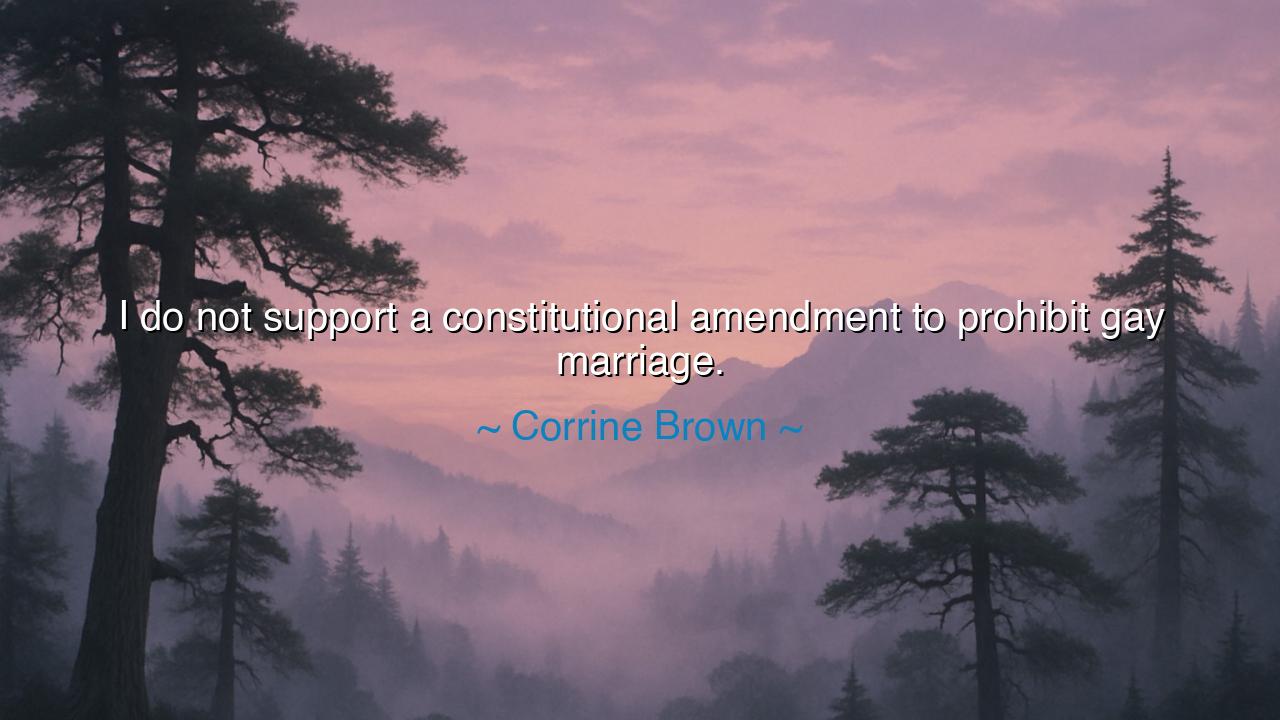
I do not support a constitutional amendment to prohibit gay






In the ever-unfolding story of human rights, there are moments when the struggle for justice and equality rises to the surface, calling for courage and conviction. The words of Corrine Brown—"I do not support a constitutional amendment to prohibit gay marriage"—echo a profound belief in the inherent dignity and rights of every individual. These words speak to a truth that has resonated through the ages: that true justice can never be limited to the privileges of a select few, but must be extended to all, regardless of sexual orientation, identity, or background. To oppose an amendment that seeks to restrict the right to love and marry is, at its core, a statement against the forces of discrimination and exclusion.
In the ancient world, the concept of justice was not just about the enforcement of laws, but about the moral framework that guided human behavior. The great Greek philosophers such as Socrates and Plato spoke of a society in which equality and justice were the foundations of a harmonious and flourishing life. Plato’s vision of the ideal society in The Republic was one where every individual, regardless of status or identity, had the opportunity to contribute to the common good. He believed that a society could not truly be just unless all people were treated with equal dignity. The words of Brown, much like those of these ancient thinkers, challenge us to rethink the laws and structures of our society to ensure they reflect this principle of inclusivity and respect for all.
Consider the struggle of abolitionists during the time of slavery. Much like the fight for gay marriage today, the abolition of slavery was a battle against entrenched beliefs and systems that denied human dignity and freedom. Frederick Douglass, Harriet Tubman, and other abolitionists fought not just to change laws, but to alter the very moral fabric of their society. They knew that true freedom could not exist unless every individual was allowed to live without the chains of inequality. The fight for gay marriage is not so different—it is a battle to ensure that every person can enjoy the same freedom to love, to marry, and to build a life with the one they choose, without fear of legal restriction or social exclusion.
The resistance to gay marriage is a reflection of the fear and prejudice that often arise when people are confronted with what they do not understand. Throughout history, those who have sought to expand rights have often faced fierce opposition from those who believe that the status quo should remain intact. Corrine Brown’s refusal to support an amendment that would prohibit gay marriage speaks to a deeper understanding of justice—a belief that true freedom and equality are not granted by a select few, but are inherent rights that every individual should be able to enjoy. The very act of banning gay marriage speaks to the fear of change, the reluctance to accept diversity and the fullness of human experience.
In the same way, Susan B. Anthony and Elizabeth Cady Stanton led the women’s suffrage movement, knowing that the right to vote was not just a matter of legal recognition but a matter of human dignity and equality. They fought for a world where women could stand as equals in society, where their voices could be heard in the halls of government. Their battle was not just against laws but against the deeply entrenched belief systems that saw women as less than men. The struggle for gay marriage follows the same path. It is not just about changing laws—it is about transforming society into one where love, in all its forms, is seen as equal in worth and dignity.
The lesson we take from Corrine Brown’s words is clear: justice is not served by laws that divide us, but by laws that unite us in equality and respect. A constitutional amendment to prohibit gay marriage would not only be a step backward in the journey of freedom and equality, but it would also be a denial of the very principles that underpin a just society. Love, in all its expressions, is a human right—a right that no government or society should have the power to restrict. By ensuring that every person has the right to marry the person they love, we move closer to a world where true justice reigns.
In your own life, take these words to heart. Reflect on the ways in which you may contribute to building a world of equality, where no one is denied the right to love and to live freely. Whether in your relationships, your community, or your role in society, ask yourself: How can I actively support the dignity and freedom of others? Just as Brown courageously stands against the forces of division, we too must stand in solidarity with those who seek to be recognized as equals. Justice is not achieved by mere hope; it is achieved through action, through the commitment to stand for what is right, even when the odds are stacked against us.






AAdministratorAdministrator
Welcome, honored guests. Please leave a comment, we will respond soon